Key takeaways:
- Artisan craftsmanship in perfume emphasizes passion, attention to detail, and the use of rare, natural ingredients to create unique fragrances that evoke emotions and memories.
- The quality of fragrance is crucial, leading to deeper connections with wearers through memorable scents that resonate on a personal level.
- Artisan brands focus on sustainability, ethical sourcing, and often produce limited-edition releases, enhancing the exclusivity and appreciation of their perfumes.
- Identifying quality ingredients involves looking for simple, transparent ingredient lists, understanding their origins, and recognizing the aromatic profiles that reflect expert craftsmanship.
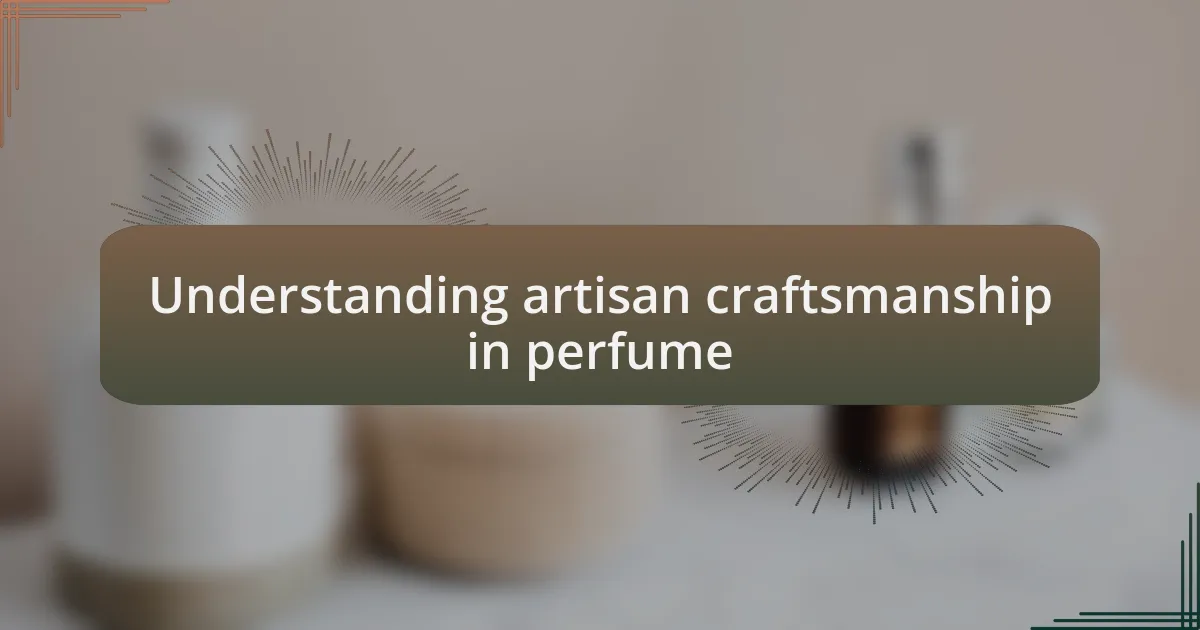
Understanding artisan craftsmanship in perfume
Artisan craftsmanship in perfume is about more than just creating scents; it’s a deep-rooted tradition that embraces passion and attention to detail. I remember visiting a small perfumery in Grasse, France, where the artisan shared how each fragrance is a story woven through carefully selected raw materials. This dedication to sourcing rare ingredients not only enhances the scent but also reflects the perfumer’s respect for nature and their craft.
The meticulous process of blending and aging fragrances is where true artistry shines. Each note—whether it’s the warmth of amber or the crispness of citrus—is like a brushstroke on a canvas. Have you ever considered how much time and effort goes into perfecting a single bottle of perfume? I learned that some artisans spend years honing their recipes, striving for that elusive balance that can trigger memories or evoke emotions in the wearer.
Understanding artisan craftsmanship is also about appreciating the irregularities that make each creation unique. I often find myself reflecting on how personal and exclusive these scents feel—like they carry a piece of the artisan’s soul. When you wear an artisan perfume, you’re not just applying fragrance; you’re embracing a history, a labor of love that transforms simple ingredients into an aromatic experience that is profoundly personal.
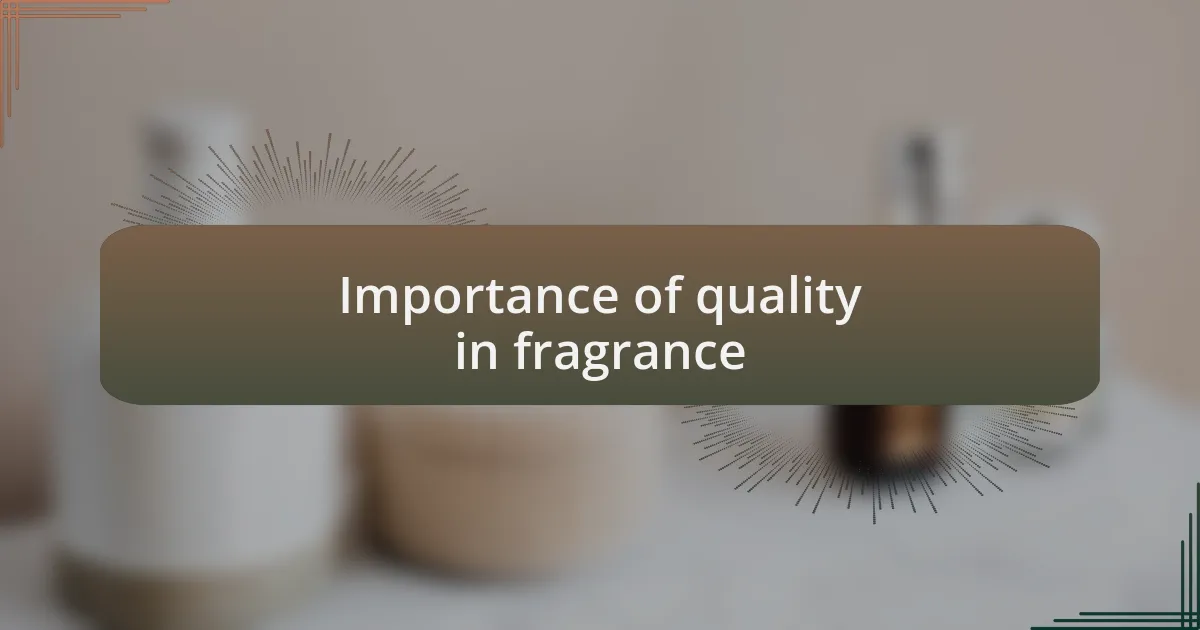
Importance of quality in fragrance
The quality of fragrance is paramount in the world of perfumery. I’ve often found that a high-quality scent not only lingers longer on the skin but also evolves beautifully over time, revealing its complexity. It reminds me of a time when I tried a mass-produced fragrance; the initial excitement quickly faded, and all I was left with was a one-dimensional smell. Isn’t it fascinating how quality can transform a simple fragrance into an experience that resonates with the heart and stimulates the senses?
When it comes to choosing a fragrance, the ingredients play a crucial role. I once had the pleasure of speaking with a perfumer who emphasized that using natural materials provides authenticity and depth that synthetic options just can’t replicate. It was a revelation to learn how each component, sourced with care, imparts its own character, making the fragrance truly multidimensional. Have you ever paused to consider how the absence of these quality ingredients can lead to a forgettable scent?
Moreover, quality in fragrance creates a lasting connection with the wearer. I vividly remember a fragrance that contained notes reminiscent of my grandmother’s garden—a blend of jasmine and rose. Wearing it became a ritual, transporting me back to those cherished moments every time I spritzed it on. This emotional tie showcases how the quality of our chosen fragrance is not merely about scent; it’s about the memories and feelings it evokes, making quality an essential factor in our olfactory lives.
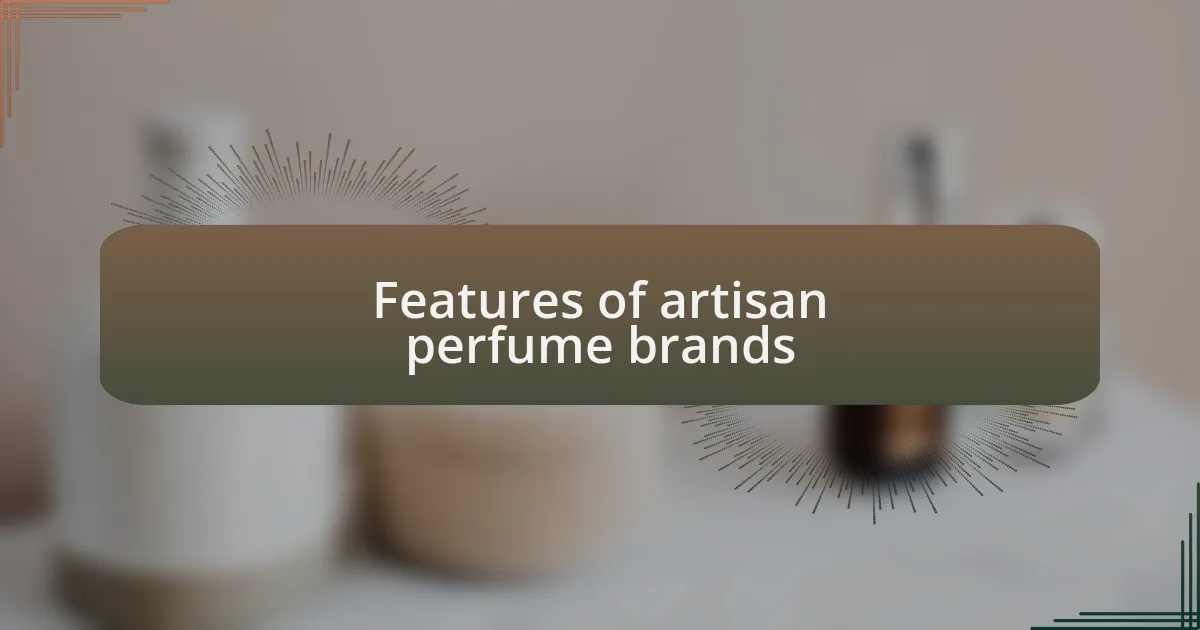
Features of artisan perfume brands
Artisan perfume brands stand out due to their emphasis on craftsmanship. Each scent is often hand-blended, which means the perfumer carefully curates every note, creating a unique story that unfolds with each application. I remember discovering a small-batch perfume that captured the essence of an evening stroll through a fragrant cedar grove. The intricacy of its layers told a tale, transporting me back to that moment with every wear.
Another feature of artisan perfumes is their commitment to sustainability and ethical sourcing. I’ve encountered brands that take great pride in using ingredients sourced from local farmers or distillers dedicated to eco-friendly practices. What struck me about one particular brand was their transparent supply chain; knowing exactly where the fragrance components came from added an extra layer of appreciation for the scent, as it felt more like a personal connection to nature and the artisans behind it.
Furthermore, many artisan brands offer limited-edition releases, which adds an exciting exclusivity to the experience. I’ll never forget stumbling upon a pop-up shop featuring a seasonal fragrance created from rare flowers that bloomed only once a year. The anticipation of owning something so scarce felt almost like possessing a piece of art. Doesn’t the idea of having something that few people can access deepen your appreciation for its craftsmanship?
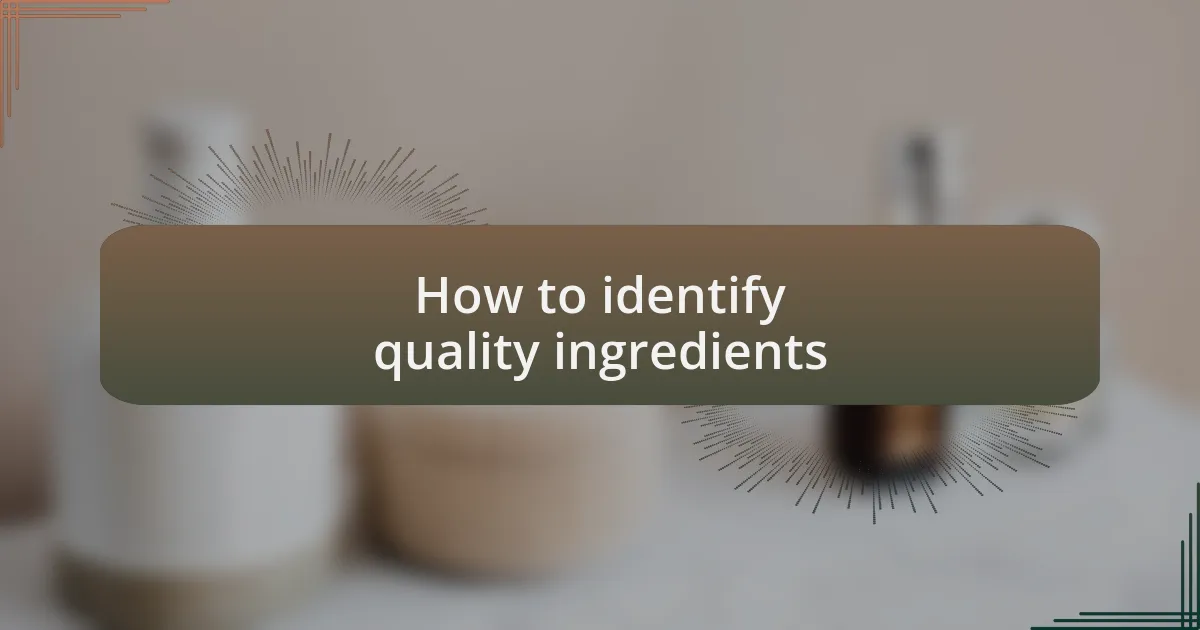
How to identify quality ingredients
When it comes to identifying quality ingredients in artisan perfumes, the first thing I focus on is the list of components. A shorter, more transparent ingredient list often signifies purity and quality. I remember unboxing a perfume with just a handful of recognizable ingredients, and it felt like a breath of fresh air compared to overly complicated scents. Doesn’t seeing clear, straightforward components make you trust the fragrance more?
Another key indicator is the origin of the ingredients themselves. I’ve found that artisan brands frequently share stories about their sourcing process, and this narrative adds depth to the scent. For example, I came across a fragrance that used hand-harvested blossoms from a specific region. Knowing that these flowers were picked at the peak of their bloom enhanced my appreciation and connection to the fragrance. How often do we consider the journey that each note has taken to reach us?
Lastly, the aromatic profile speaks volumes about the quality of the ingredients. When I smell a perfume that has a complex yet harmonious blend, it often reveals the expert craftsmanship behind it. I once tested a scent that evolved beautifully over the hours, with every note revealing itself in a deliberate dance. This kind of experience is a testament to using high-quality materials, as they can create depth and character that lower-quality ingredients simply cannot match. Isn’t it fascinating how a scent can evoke emotions and memories, all based on the quality of what’s inside the bottle?
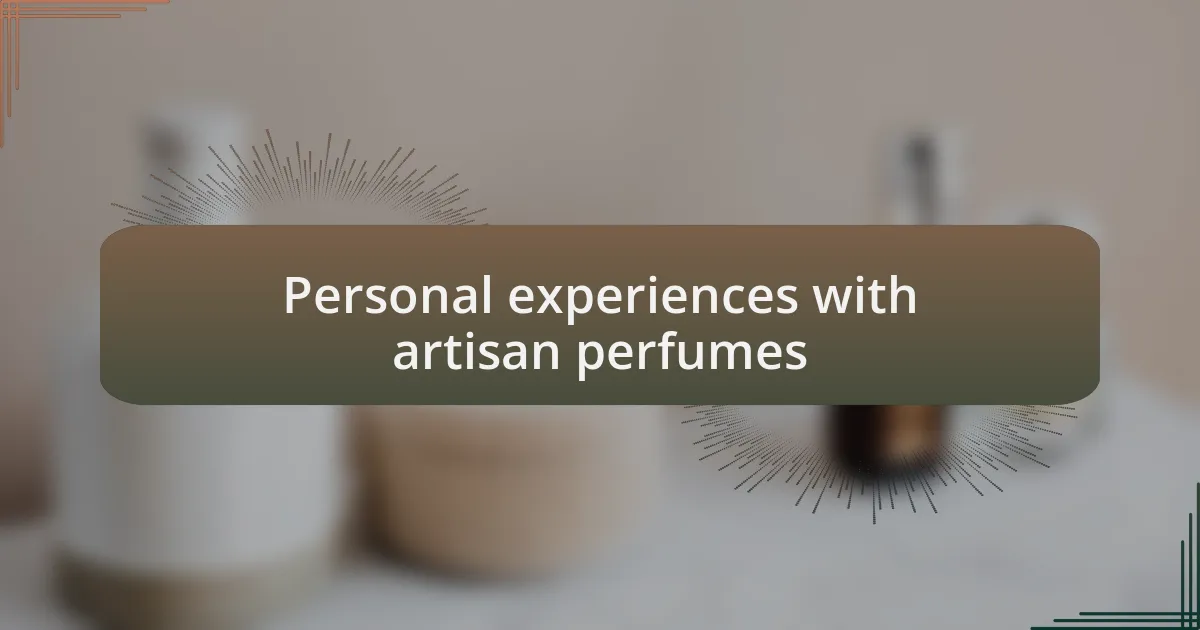
Personal experiences with artisan perfumes
The first time I experienced an artisan perfume, it was like stepping into a new world. I remember walking into a small boutique and being greeted by a scent that immediately transported me to a sunlit garden filled with blooming flowers. The layers of the fragrance unfolded gradually, allowing me to savor notes I hadn’t encountered before. Have you ever felt a perfume resonate with you on such a deep level that it almost felt personal?
One evening, I attended a perfume tasting event featuring artisan creations. As I explored different scents, I was captivated by one that combined earthy vetiver with sweet vanilla. The blend was so well-crafted that it evoked memories of childhood adventures in nature but also brought warmth and comfort. I couldn’t help but wonder—can a scent really encapsulate a moment in time? For me, this one certainly did.
I’ve also found that wearing artisan perfumes often sparks conversations with others who appreciate craftsmanship. Just last week, a stranger complimented my fragrance, and we ended up sharing stories about our favorite scents. It was a beautiful reminder of how artisan perfumes do more than just smell good; they create connections. Isn’t it wonderful how a simple scent can bring people together in unexpected ways?
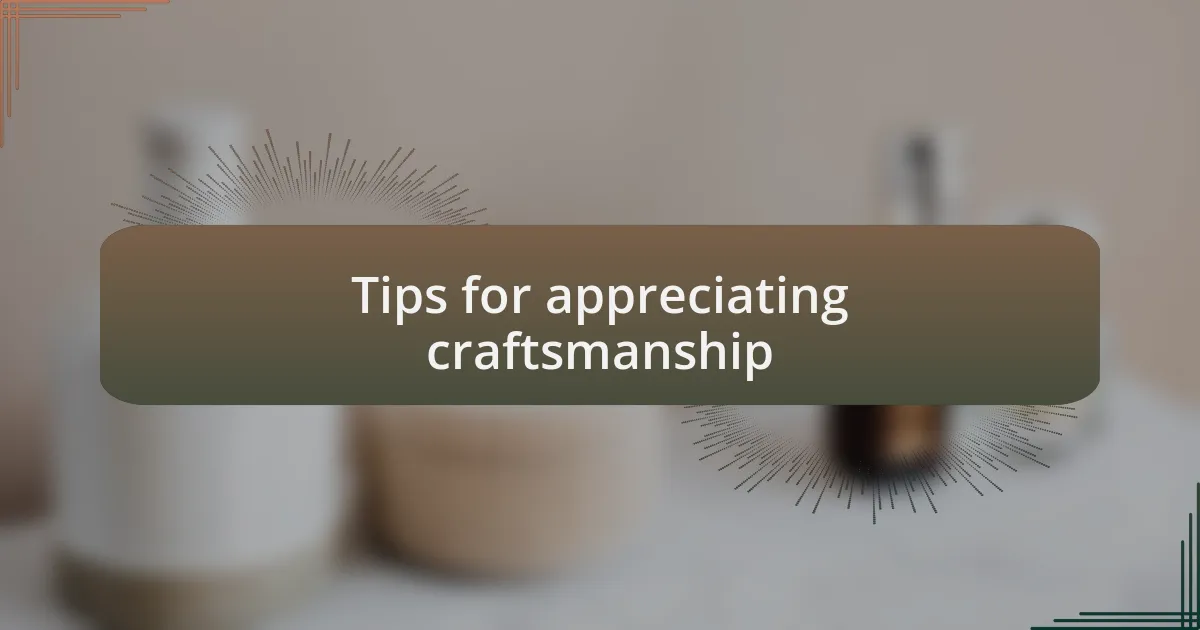
Tips for appreciating craftsmanship
When I engage with artisan craftsmanship, I find that understanding the story behind each piece enhances my appreciation significantly. I remember asking a perfumer about their inspiration for a particular scent and being fascinated by how their travels influenced the notes they chose. Isn’t it amazing how a single fragrance can encapsulate so much history and emotion?
Pay attention to the details that set artisan creations apart from mass-produced items. For instance, the texture of a beautifully crafted bottle can speak volumes about the care involved in its creation. I recall feeling an instant connection with a perfume bottle that was not only visually stunning but also had an intriguing shape that fit perfectly in my hand. Doesn’t it make you appreciate the artistry more when you physically connect with the craftsmanship?
Lastly, I suggest taking a moment to reflect on your own emotions when experiencing a fragrance. I’ve had moments where a scent unexpectedly brought joy, sparking memories from my childhood or a special event. Have you noticed how some perfumes can transport you to a different time or place? By savoring these emotional connections, you deepen your experience and truly begin to appreciate the art behind artisan perfumes.